Zona de Azar Israel – Optimove: “Timing is Everything When Communicating with Your Players”

 Israel.- 14th March 2023 www.zonadeazar.com There’s this saying: Nothing is worse than meeting the perfect person at the wrong time. When you communicate with your players or send them offers on a specific day, even if it’s your best performing day, you are missing out on many golden opportunities to get so much more.
Israel.- 14th March 2023 www.zonadeazar.com There’s this saying: Nothing is worse than meeting the perfect person at the wrong time. When you communicate with your players or send them offers on a specific day, even if it’s your best performing day, you are missing out on many golden opportunities to get so much more.
Think about your day-to-day life. A lot of the activities you do, many others perform on the exact same day and time. Do you have lunch around 12pm? Take out the dog first thing after getting back home from work? On Fridays, do you go out with friends or family? In the beginning of each week, we all get the blues. Think about it: we very rarely stray from some of these daily or weekly routines.
Taking this human behavior into the gaming world, it’s reasonable to assume that players have the same scheduled behavior. Many sport betting operators send their communications – whether it is ad-hoc information campaign based on weekend matches or automated promotions – to all their players at the same time. In the online casino industry, ‘Lucky Monday’ or ‘Super Thursday’ kinds of promotions are very common, blasting customer bases with this weekly ‘happy day.’

In a way, it makes sense. Most of sport events occur during weekends, which dramatically effects the betting trend that reaches the weekly peak on Saturday. The online casino brands usually choose their strongest or weakest day of the week when strategizing and attracting players.
But reexamine your daily routine and let’s see if you can answer these set of questions: On which day do you call your parents? Which day is it your turn to pick up the kids from daycare? Which day are you going to the gym or play football with friends?
Chances are, you and I gave different answers to these questions, and if so, what made us so sure that playing and betting behavior is a common activity? Do all bettors behave the same and have the same weekly timing? No.
Every sport betting company knows their customers’ strongest days of the week, though the days can vary for different regions.
For our analysis, we chose the UK as our region to try and keep our players’ group comparable, with shared expected behavior. In the following analysis, which contains data from more than 10 sport betting brands that have operated in the UK since August 2018, and the following six months, (to eliminate the world cup effects), we first confirmed a known fact – more bets occur during the weekend and mostly on Saturdays:
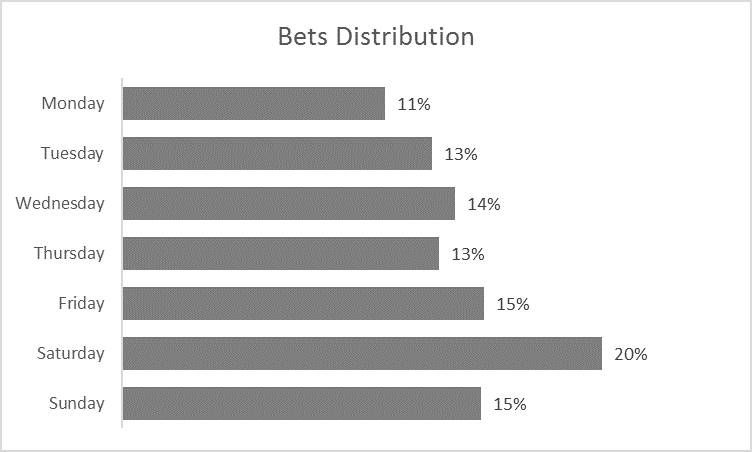
20% of the bets are placed on Saturday. Friday and Sundays have the second and third highest bet distribution (both 15%), and these three days are responsible for 50% of the total bets placed.
After we realized the betting behavior checked out, we then wanted to see which of our players holds the same betting behavior in terms of days of the week.
To do so, we defined the most active weekday for each player during the 6-month period, counting whether the player placed a bet during each day, and flagging it as an active day. The weekday on which the player visited and played for the most amount of time, was considered this player’s favorite day. We considered players with multiple days as multi-day-customers, and we then split them into three groups:
Group Weekdays: Consists of players who play more on weekdays.
Group Weekends: Consists of players how play more on weekend days.
Group All-Around: Consists of players who play the same number of times on weekdays and weekends.
We ran the analysis for players with more than 1 bet day.
Below you can find the outcome:
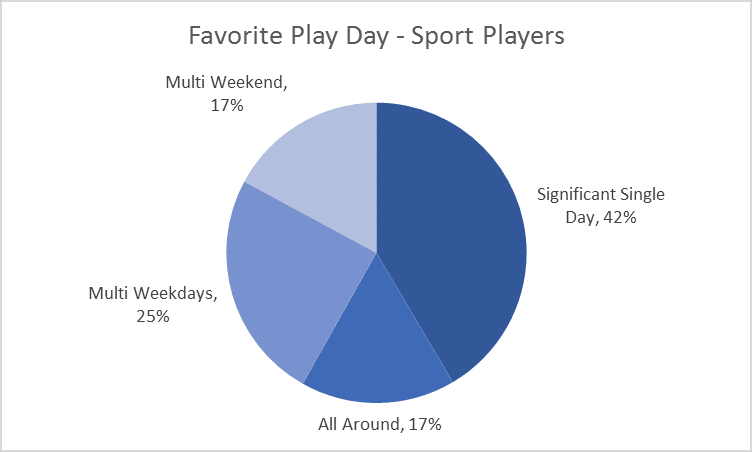
As the pie chart shows, 42% of the players have a specific day where they tend to visit the brand more often. What’s surprising is that 25% of the players have no significant favorite day, but play more during the weekdays.
When taking a closer look at players with a favorite bet day, we found the following results:
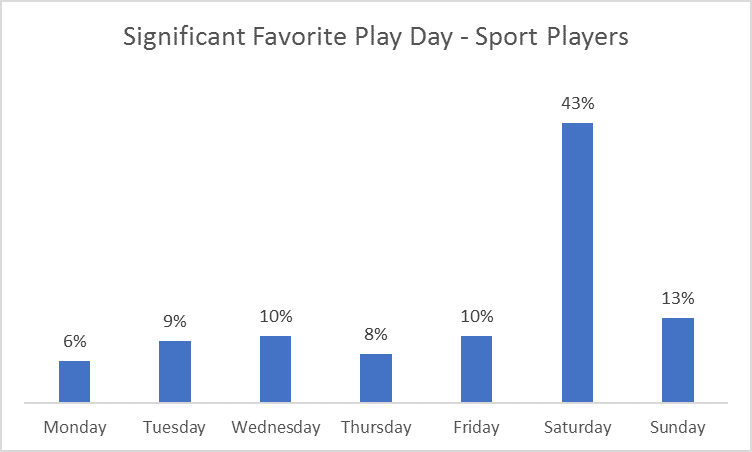
Of 42% of the customers with a unique favorite bet day, 43% prefer Saturday as a favorite day (18% of the population, 43% out of 42%). In addition, 10% bet mostly on Fridays (4.2% of the population) and 13% bet mostly on Sundays (5.4% of the population). A sum of all the players who prefer to bet during weekends, multi or single, amounts to 44.6% of the population. Considering that weekends are the most popular days in general, We’ll add the ‘all around’ players, that have an unknown favorite bet day – to this population and we’ll get almost 62%.
Although most of the bets were placed during weekends and more players play during these days, the number above emphasize sport betting brands’ ineffective communication with players. Almost 40% of all customers prefer to play during weekdays, not at all during the times the communications were sent.
Not Only Sport
The unideal communication timing is not exclusive to the sport betting industry. Many marketers share the same issue in terms of targeting. Online casino operators are in love with their weekly offers, which repeats for all players on the same weekday. When creating the same analysis for British players based on casino game days, we find an even stranger trend for players with a significant favorite casino game day (45% of the players):
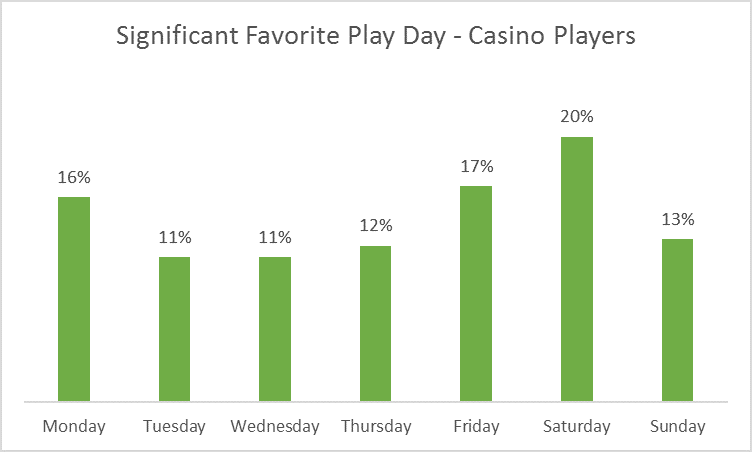
In the online casino industry, we can see that although more players tend to be more active during the weekend, many players hold weekdays as their preferred game day. When aggregating all players with a significant preferred weekend day, players with multi weekend days, and all-around players, we reach the same value as in sport betting: 63%. A blast communication before the weekend isn’t a great approach for almost 40% of the players.
To solve this issue, we dive into the data. A smart strategy entails calculating each player’s preferred betting day and to reach out on that day. Instead of sending a mass communication on a specific day, split the campaign to seven by the favorite weekday, and send the communications separately to the relevant players. In this case, you’ll ensure that your players are getting your messages on the days with the highest response rates. It is important to mention that in case of testing, you’ll must compare the response rate to a control group. Why? As the activity during the weekend is higher, you might think that you are getting more responses to your communication, while a control group will assure that you are creating a significant impact every day regardless of the sport weekly activity trend.
By the Hour
In terms of timing, we have many assumptions based on the plural behavior – we are sending most of our communications at the same time of day, assuming all customers will open our emails or engage with our SMS at the same time. In the below matrix, you can find the bet distribution for the same group of British players we started with, combining days and hours.
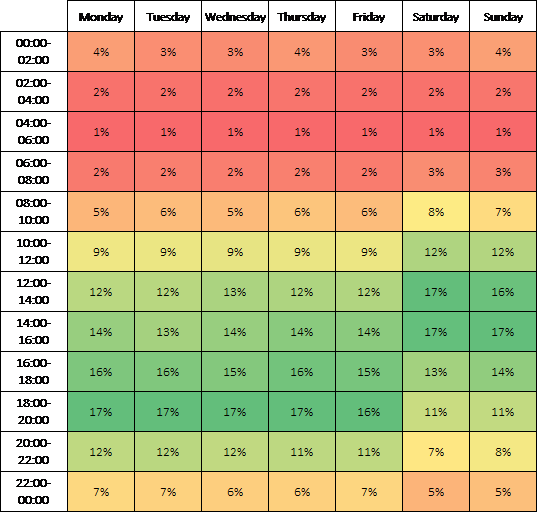
We find that for most of the weekdays, or to be exact – working days, (and for the purpose of this analysis, Friday ‘behaves’ like a weekday), a significant portion of players place bets after 12pm. During the weekend, players place bets earlier. Should sport betting operators get familiar with this fact? Should marketing teams change their communication schedules based on it? Is this plural behavior knowledge enough to make an impact?
I set the favorite time of day as the hour with more than 50% bets of each player’s total. To make it relevant, I analyzed only players with more than 20 bets during the 6-month-period. The results: Amongst these players, around 45% had a significant favorite hour.
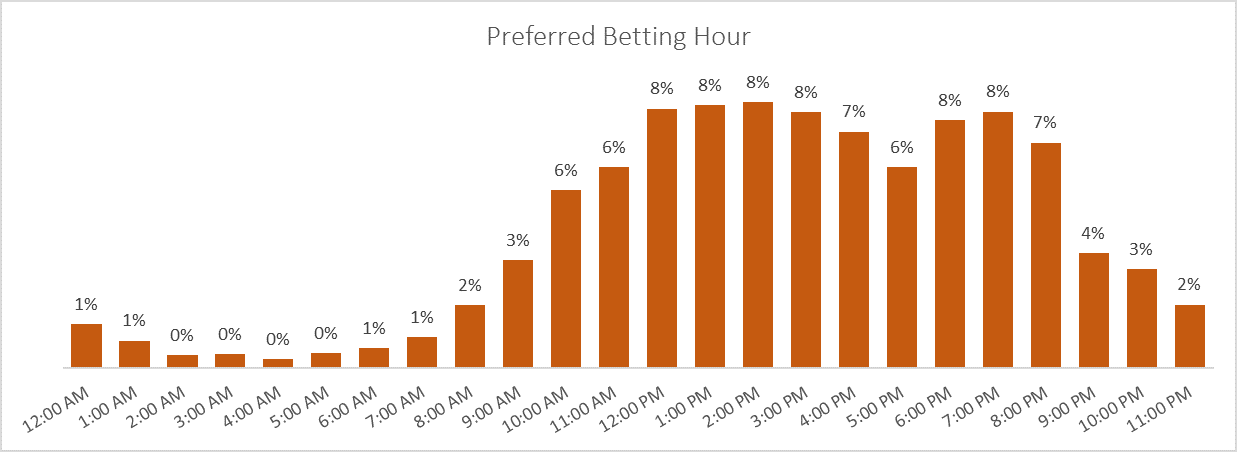
When uncovering the preferred time distribution, we find that it’s almost unified between 10:00AM to 8:00PM – (it’s that old whale-shaped graph you probably know from similar tests). In this case, when is the right time to communicate with these bettors?
Optimize, Strategize, Personalize
If you’ve read this far, you understand that the answer is always personalization – each player should hold his or her own preferred time and receive their own scheduled communication. A proper analysis and personalized calculation may increase your communication metrics and KPIs. The ability to analyze and understand player’s behavior and to obtain an automated procedure—allowing you to act at the right time—can influence customers’ response dramatically.
The gaming industry is becoming more data driven and competitive- you need to make sure you’re meeting your perfect prospects at the right time.
Edited by: @MaiaDigital www.zonadeazar.com